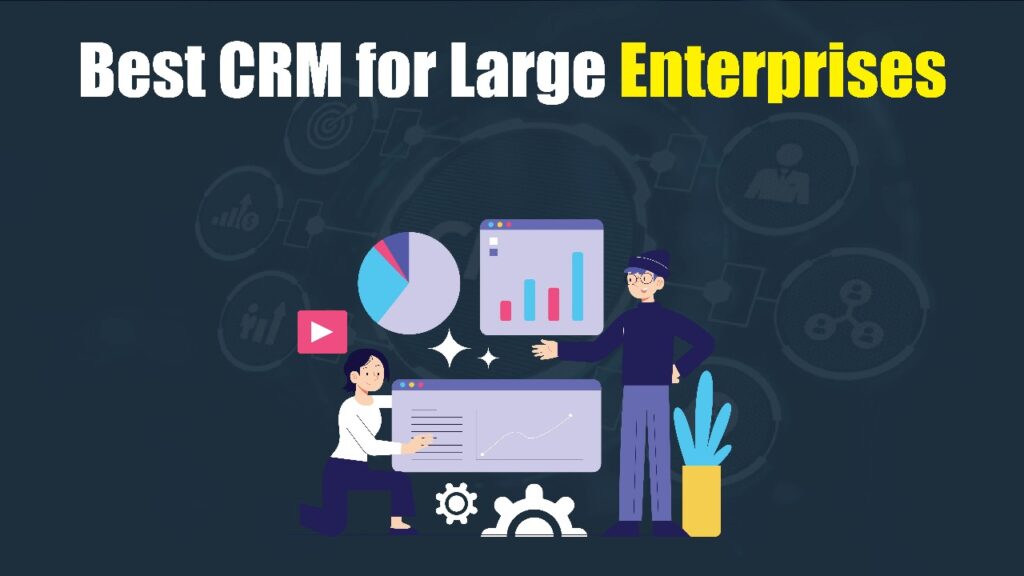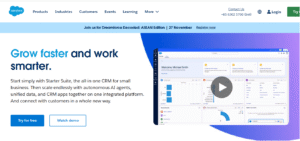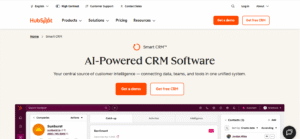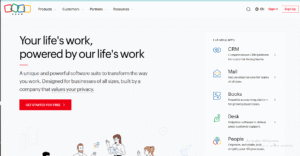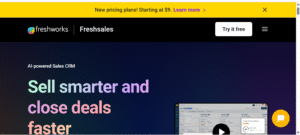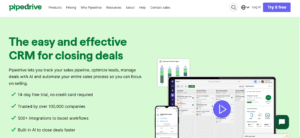When a business grows into a large enterprise, managing customers, data, departments, and communication becomes far more complex than what basic CRM tools can handle. If you’ve been searching for a powerful CRM that can scale with thousands of customers, hundreds of employees, and multiple business units you are at the right place. Enterprise CRMs are built to streamline operations, centralize data, and support advanced automation so your teams can work smoothly across regions and channels. Sounds good, right?
Large organizations usually deal with massive workflows, layered approval processes, and detailed reporting needs, which is why choosing the right CRM becomes a mission-critical decision. If you want clarity, speed, and long-term scalability, exploring the best enterprise CRMs is the perfect starting point.
What is an Enterprise CRM?
An enterprise CRM is a large-scale customer management platform designed to support big organizations that handle thousands of leads, cross-department communication, and advanced sales workflows. Unlike basic CRMs, enterprise-level systems include deeper automation, custom integrations, advanced analytics, and extremely high data capacity. These tools allow different teams such as marketing, sales, finance, customer service, and operations to collaborate in a unified system without losing track of customer history or business objectives.
Enterprise CRMs also allow companies to customize workflows at every level. From building complex pipelines to designing automated processes, these platforms provide flexibility for large businesses with unique structures and diverse working environments.
Why Do Large Enterprises Need a CRM?
Large enterprises rely on CRMs because managing customer data at scale requires structure, automation, and real-time visibility. Without a centralized system, teams often face issues like duplicated data, slow communication, and inconsistent follow-ups. A CRM solves all these problems by allowing organizations to store data, track interactions, manage pipelines, and establish performance metrics all in one place.
Whether it is onboarding new clients, handling customer complaints, managing big sales deals, or planning marketing campaigns, a CRM ensures that every step is recorded and executed properly. This results in better customer satisfaction, higher productivity, and smoother operations across the entire company.
How to Choose the Right Enterprise CRM?
Choosing the best enterprise CRM requires clarity on your organizational needs, team size, and long-term goals. Large businesses must consider automation capabilities, integration options, customization levels, security standards, and overall scalability before making a decision. The right CRM should be able to support heavy workloads while offering flexible features that adapt to multiple departments.
It’s also important to evaluate how well the CRM aligns with your existing tools and workflows. A system that integrates easily with email platforms, ERP software, analytics tools, and communication channels will save your team time and eliminate repetitive tasks.
Top 10 Best CRM for Large Enterprises
Here is the complete list of the top platforms we will cover:
- Salesforce CRM
- HubSpot Enterprise CRM
- Zoho CRM Enterprise
- Microsoft Dynamics 365
- Oracle NetSuite CRM
- SAP CRM
- Freshsales Enterprise
- Pipedrive Enterprise
- SugarCRM
- Creatio CRM
#1. Salesforce CRM
Review
Salesforce CRM is considered the most powerful and scalable enterprise CRM in the world, making it a top choice for large organizations that require advanced automation, multi-department workflows, and deep data management. It supports complex sales cycles, global teams, and massive customer databases without compromising performance.
The platform is known for its robust customization capabilities, allowing enterprises to design workflows, dashboards, and integrations exactly the way they operate.
Features
- AI-powered insights with Einstein Analytics
- Highly customizable dashboards and workflows
- Advanced automation for sales, marketing, and service
- Enterprise-level security and compliance
- Integration with thousands of apps through AppExchange
Pros
- Extremely scalable for large global teams
- Powerful reporting and analytics
- Extensive customization options
- Strong ecosystem with third-party apps
Cons
- Can be expensive for enterprises
- Requires technical knowledge for advanced customization
- Some features have a steep learning curve
Final Verdict
Salesforce CRM is the ideal choice for enterprises needing a robust, customizable, and deeply integrated platform. Its ability to handle complex workflows and large data volumes makes it perfect for globally distributed teams and companies with multilayered departments.
#2. HubSpot Enterprise CRM
Review
HubSpot Enterprise CRM offers a user-friendly yet powerful system designed for large companies that want smooth automation, centralized communication, and advanced analytics without overwhelming complexity. Its interface is clean and intuitive, making it easy for large teams to get onboard quickly.
HubSpot’s enterprise suite includes marketing automation, sales pipelines, customer service tools, and content management, all integrated under one unified platform.
Features
- Enterprise-grade marketing automation
- Advanced reporting and custom dashboards
- AI-powered content and sales tools
- Built-in CMS, live chat, and customer service tools
- Unlimited email tracking and automation sequences
Pros
- Very easy for large teams to adopt
- Strong inbound marketing tools
- Unified ecosystem for marketing, sales, and support
- Clean, intuitive interface
Cons
- Enterprise features can become pricey
- Limited customization compared to Salesforce
- Some advanced tools require onboarding support
Final Verdict
HubSpot Enterprise CRM is perfect for companies wanting a modern, fast-learning CRM that integrates marketing and sales without technical complications. It delivers strong automation features while keeping the user experience simple and effective for big teams.
#3. Zoho CRM Enterprise
Review
Zoho CRM Enterprise is a solid, cost-effective solution for large organizations that need robust features without the heavy expense usually associated with enterprise CRMs. It offers a wide range of tools from automation and analytics to AI-driven insights making it suitable for companies looking for functionality and affordability.
Zoho’s modular ecosystem allows enterprises to integrate different apps such as Zoho Books, Zoho Desk, and Zoho MarketingHub, creating a cohesive environment for all operational needs.
Features
- AI assistant Zia for predictions and insights
- Multi-user portals and advanced workflows
- Territory management and scoring rules
- Custom dashboards and deep analytics
- Integration with the entire Zoho ecosystem
Pros
- Affordable compared to most enterprise CRMs
- Strong automation and workflow tools
- Flexible customization options
- Integrates easily with other Zoho apps
Cons
- Interface is not as smooth as HubSpot
- Some features feel basic compared to Salesforce
- Customer support can vary by region
Final Verdict
Zoho CRM Enterprise is an excellent option for organizations seeking enterprise-level tools without premium pricing. It provides a strong feature set, solid automation, and detailed analytics that help teams collaborate effectively.
#4. Microsoft Dynamics 365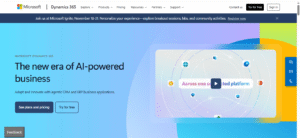
Review
Microsoft Dynamics 365 is a comprehensive enterprise CRM and ERP solution designed for large organizations that need deeply integrated business operations. It goes beyond customer management by connecting sales, marketing, finance, supply chain, and customer service into one unified system.
Dynamics 365 is particularly strong for enterprises already using Microsoft tools such as Office 365, Teams, and Azure, as it integrates seamlessly with the existing ecosystem.
Features
- Native integration with Microsoft Office, Teams, and Azure
- AI-driven insights through Dynamics 365 AI
- Unified CRM and ERP modules
- Advanced workflow automation
- Enterprise security and compliance tools
Pros
- Extremely powerful for large companies
- Deep integration with popular Microsoft tools
- Flexible modular structure
- Strong analytics and automation capabilities
Cons
- Implementation can be complex
- Pricing varies depending on modules
- Requires training for full utilization
Final Verdict
Microsoft Dynamics 365 is the best choice for enterprises that want a unified solution for CRM and ERP operations. It brings together all core business functions, enabling smoother data flow and stronger collaboration across teams.
#5. Oracle NetSuite CRM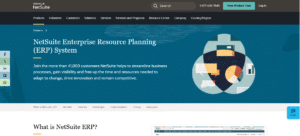
Review
Oracle NetSuite CRM is a sophisticated enterprise-level system built for large, data-heavy organizations that require end-to-end customer lifecycle management. It provides comprehensive tools for sales force automation, marketing, customer support, and e-commerce, making it an all-in-one platform for enterprises seeking centralized operations.
Its strong ERP integration is one of its biggest strengths, allowing companies to manage sales and financial data in a seamless environment. NetSuite excels in global operations with features like multi-currency, multi-location, and international tax support, making it a top choice for multinational brands.
Features
- Complete customer lifecycle management
- Built-in ERP and e-commerce integrations
- Advanced sales automation tools
- Global business management features
- Real-time dashboards and analytics
Pros
- Ideal for multinational corporations
- Strong integration with ERP tools
- Highly scalable for enterprise needs
- Excellent reporting and analytics
Cons
- Pricing can be high
- Implementation is time-intensive
- Interface may feel outdated to some users
Final Verdict
Oracle NetSuite CRM is designed for large enterprises that need a powerful, all-in-one system capable of supporting global operations. Its ability to combine CRM, ERP, and e-commerce makes it extremely valuable for businesses that manage complex international workflows.
#6. SAP CRM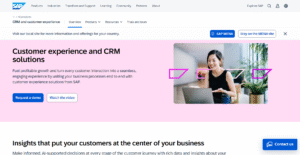
Review
SAP CRM is a robust enterprise-level customer management system designed for large organizations that need highly structured processes and deep operational control. Known for its powerful automation and global data management, SAP CRM integrates seamlessly with SAP’s ERP and supply chain systems, making it extremely useful for multinational corporations with complex workflows.
The platform excels in handling large-scale customer databases and overseeing sales, marketing, and service activities in a unified ecosystem.
Features
- Full integration with SAP ERP and supply chain modules
- Advanced automation for sales and service
- Multi-channel customer engagement tools
- Enterprise-grade analytics and reporting
- Strong role-based access and security
Pros
- Ideal for global enterprises
- Extremely reliable for large data operations
- Strong automation and workflow capabilities
- Deep integration across SAP ecosystem
Cons
- Implementation can be long and complex
- Expensive compared to mid-tier CRMs
- Requires training to operate efficiently
Final Verdict
SAP CRM is the best option for enterprises that already rely on SAP systems and need a unified platform to manage customer journeys at scale. Its powerful integration, automation, and reporting capabilities support complex business structures and global operations.
#7. Freshsales Enterprise
Review
Freshsales Enterprise is a modern, intuitive CRM built for growing large businesses that want advanced automation without the complexity of traditional enterprise CRMs. It provides a clean interface, AI-driven insights, and strong workflow automation, making it easier for teams to manage leads, pipelines, and customer conversations efficiently.
Freshsales Enterprise also integrates seamlessly with Freshdesk, Freshmarketer, and other Freshworks tools, creating a unified system for sales and customer support.
Features
- AI-powered sales insights with Freddy AI
- Advanced workflows and automation rules
- Custom pipelines and dashboards
- Built-in phone, email, and chat integrations
- Strong collaboration tools across teams
Pros
- User-friendly design for large teams
- Powerful automation at a reasonable price
- Seamless integration with Freshworks suite
- Fast onboarding and low learning curve
Cons
- Not as customizable as Salesforce or SAP
- Some advanced analytics require upgrades
- Limited third-party integrations compared to larger CRMs
Final Verdict
Freshsales Enterprise is excellent for large businesses wanting a modern CRM that balances ease-of-use and powerful automation. It offers strong AI features, rich communication tools, and efficient pipeline management without overwhelming users.
#8. Pipedrive Enterprise
Review
Pipedrive Enterprise is a streamlined CRM designed for large organizations that want efficient pipeline management, clear visibility, and fast sales tracking. It focuses heavily on usability and makes it easy for enterprise teams to organize leads, automate tasks, and improve sales performance. Pipedrive’s Enterprise plan includes enhanced security, advanced reporting tools, and dedicated support, which help large teams operate smoothly at scale.
Features
- Advanced roles, permissions, and team security
- Smart workflow automation
- Customizable pipelines and reporting
- AI insights and deal recommendations
- Unlimited dashboards for analytics
Pros
- Extremely easy to use for large teams
- Strong focus on sales processes
- Helpful automation tools
- Affordable compared to most enterprise CRMs
Cons
- Limited marketing features
- Not ideal for highly complex workflows
- Fewer integrations than HubSpot or Salesforce
Final Verdict
Pipedrive Enterprise is ideal for organizations that want a straightforward, sales-focused CRM with strong tracking and automation. It offers enterprise-level support and security without complicating daily processes.
#9. SugarCRM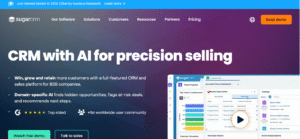
Review
SugarCRM is a feature-rich enterprise CRM known for its flexibility, customization options, and strong automation capabilities. It is designed for businesses that need deeper control over their CRM setup and want to adapt the system exactly to their sales and service workflows. SugarCRM provides powerful analytics, detailed customer insights, and strong data management, making it suitable for large teams handling complex customer lifecycles.
Features
- High-level customization and workflow automation
- AI-driven insights through SugarPredict
- Advanced reporting and analytics
- Strong case management tools
- Flexible integration options with APIs
Pros
- Highly customizable
- Strong automation and AI insights
- Suitable for complex enterprise workflows
- Reliable for large-scale customer support operations
Cons
- Requires technical expertise for setup
- Interface is less modern than newer CRMs
- Can be costly with additional modules
Final Verdict
SugarCRM is a powerful solution for enterprises that need a deeply customizable platform with advanced automation and strong service management tools. Its flexibility allows businesses to create a CRM that matches their exact operational needs.
#10. Creatio CRM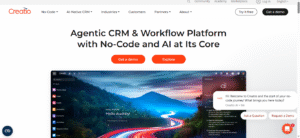
Review
Creatio CRM is a highly advanced, process-driven enterprise CRM known for its low-code platform that allows teams to build custom workflows and applications without heavy programming. It is ideal for large companies that want complete flexibility while maintaining structure and efficiency. Creatio’s strength lies in its ability to automate complex processes across sales, marketing, and customer service.
Features
- Low-code and no-code workflow builder
- Unified CRM for sales, service, and marketing
- Strong business process automation (BPA)
- AI-based scoring and insights
- Enterprise-grade analytics and dashboards
Pros
- Extremely flexible due to low-code tools
- Perfect for complex enterprise processes
- Strong automation capabilities
- Centralized CRM + BPM in one system
Cons
- Learning curve for non-technical users
- Requires time to build custom workflows
- Pricing can be high for enterprise modules
Final Verdict
Creatio CRM is an excellent choice for enterprises that need a customizable, process-driven CRM capable of automating detailed business workflows. Its low-code environment makes it possible to build tailored solutions without extensive development work.
Final Thoughts
Choosing the right CRM for a large enterprise is more than just picking software; it is about selecting a system that can handle massive data volumes, high-level workflows, and long-term scalability. Each CRM in this list offers something unique.
When implemented correctly, an enterprise CRM becomes the backbone of your operations, driving performance, efficiency, and smarter decision-making across departments. Large enterprises thrive when they have tools that communicate seamlessly, deliver real-time insights, and support every stage of the customer journey.
Frequently Asked Questions (FAQs)
What makes an enterprise-level CRM different from a small-business CRM?
Enterprise CRMs are built to handle large volumes of data, multiple teams, complex workflows, and advanced automation requirements.
Which CRM is best for very large corporations with global operations?
Salesforce CRM and Microsoft Dynamics 365 are top choices for global enterprises because they offer multi-language support, strong compliance capabilities, scalable infrastructure, and powerful automation tools suitable for multinational teams.
Is it difficult to implement a CRM for large enterprises?
Enterprise CRM implementation can be challenging due to data migration, team onboarding, and system customization.
Are enterprise CRM platforms customizable?
Yes, almost all enterprise CRMs provide deep customization options. You can tailor dashboards, automation rules, integrations, workflows, and reporting tools to match your business needs.
Which enterprise CRM offers the best automation features?
Salesforce CRM, HubSpot Enterprise CRM, and Creatio CRM are known for their strong automation engines.
